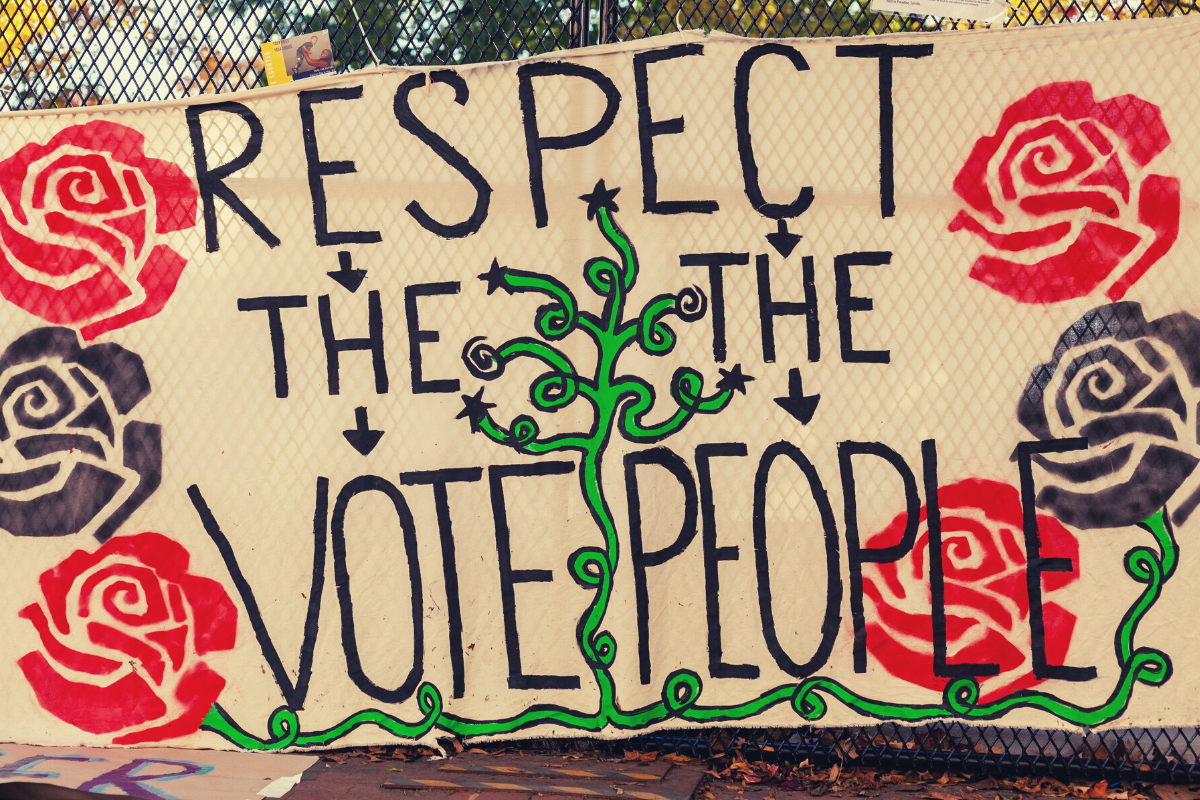Top Stories
Understanding the Return of Socialism
Gen Z’s simultaneous distrust of government and gravitation towards social democracy is therefore not paradoxical, it is causal—the embrace of socialist-lite policies is a consequence of distrust of the prevailing liberal establishment.

How are we to understand the apparently paradoxical attitudes of Generation Z (the cohort born between 1997 and 2012) towards socialism? In its fifth annual report, the Victims of Communism Memorial (VOC) found that 49 percent of Gen Z view the term “socialism” favorably, compared to 40 percent in 2019. On the other hand, the report found that an abysmal six percent of Gen Z trusts the government to take care of their interests. A Pew Research Center report also found that young people are much less trusting of elected officials than older age groups. So, although most of Gen Z has little faith in the government to effectively act on their behalf, many of them support an economic system which gives more power to the state.
The COVID-19 pandemic has undoubtedly contributed to Zoomers’ evolving views. While over 80 million Americans have become unemployed since March 2020, the billionaires of the United States have increased their wealth by $1.3 trillion. However, the growing popularity of socialism among the young cannot solely be attributed to the pandemic—a 2019 poll found that 61 percent of Gen Z voters already viewed the term “socialism” positively. Evidence of wealth inequality more generally has likely shifted young people’s opinions of the current economic system, and may have pushed them to favor more socialist-leaning policies.
It is important to bear in mind that, like liberalism and conservatism, socialism does not have one universal definition or form. In the same way that not all conservatives are pro-life, or not every progressive supports a single-payer healthcare system, there is no unanimity amongst socialists as to what their vision for society ought to look like. Whereas 31 percent of Gen Z respondents to the VOC report said they support the gradual elimination of the capitalist system in favor of a more socialist one, only 12 percent said they believe society would be better off with the abolition of private property.
The discrepancies in Gen Z’s idea of socialism suggest that a Soviet-style October Revolution orchestrated by the TikTok generation is unlikely. A HarrisX poll reached similar conclusions, reporting that nearly half of young adults think that socialism simply means providing necessities and ending poverty, with no mention of abolishing the market economy. So, when Gen Z expresses favorability towards socialism, it appears that the majority understand it simply as a means to achieve a better standard of living for more people, without surrendering the right to own property and manage private enterprise—a far-cry from Marx’s dictatorship of the proletariat.
Findings like these indicate that much of Gen Z’s socialist sympathies would orient them towards the platforms of Western Europe’s social democratic parties, rather than the doctrines set out in The Communist Manifesto. Many Zoomers seem to align ideologically with parties like the Social Democrats in Germany and Sweden and the Socialist Party in France. Far from envisioning a utopia purged of all forms of capitalism, these parties, although varying from country to country, generally advocate improving accessibility to healthcare and education, empowering labour unions, prioritizing citizens over corporations, and other likeminded policies intended to improve the lives and social security of their citizenry.
It should surprise no one that this form of governance resonates with young people. Wages in the United States have remained stagnant for decades, and they are faced with an unforgiving housing market and national student loan debt totaling over $1.7 trillion. As a member of Gen Z, I certainly have it easier than previous generations in several respects. But it is also true that achieving financial independence in adulthood during a time of peace will likely be more difficult for me than it was for my parents or my grandparents.
So it is understandable that many among my generation are inspired by politicians, like Bernie Sanders and Alexandria Ocasio-Cortez, who endorse universal healthcare and free college education. Regardless of whether or not you agree with their politics, politicians like these have struck a chord with young people who feel disenfranchised by the present system. The uphill economic battle many young people are fighting today is only exacerbated by a system of government that seldom represents their interests. A study which analyzed nearly 1,800 public policy decisions over 20 years found that the desires of average American voters appeared “to have only a minuscule, near-zero, statistically non-significant impact upon public policy.” Economic elites, on the other hand, were more successful than any other group in having their interests reflected in legislation.
Gen Z’s growing distrust of government demonstrates an understanding of politicians’ failure to represent their interests. From young people’s perspective, it has become increasingly difficult to reconcile the absence of a European-style safety net with the massive bailouts available to those on Wall Street who thrust the global economy into meltdown. So when Gen Z hears crowdfunded politicians like Sanders or Ocasio-Cortez recommending policies that aim to improve their lives, and not fill the pockets of corporate donors, they listen. Although self-proclaimed American socialist candidates incorrectly identify the Nordic model as a glimmering example of successful socialism—the Danish Prime Minister was moved to clarify that market economies like that of Denmark are certainly not socialist—they have generated demand among young Americans for legislation that is commonplace within Scandinavian social democracies.
Gen Z’s simultaneous distrust of government and gravitation towards social democracy is therefore not paradoxical, it is causal—the embrace of socialist-lite policies is a consequence of distrust of the prevailing liberal establishment. Poor representation from government officials has caused young Americans to lose faith in the nation’s political institutions, which has led them to favor a new system in which citizens’ basic needs are guaranteed by the state. They simply do not believe that politicians who prioritize powerful business interests will properly represent them.

Nor is the popularity of left-leaning policies in America limited to Gen Z. Pew Research Center found that a majority of Americans, 63 percent in both surveys, are in favor of tuition-free college and believe that the federal government should be at least partially responsible for ensuring all Americans have healthcare coverage. A 2020 survey also found that only 20 percent of Americans trust the federal government, and a majority of voters believe the government is failing to address issues surrounding the environment, poverty, and healthcare. Distrust in politicians’ ability to effectively lead the nation is also spreading among Americans, who say they want more effective approaches to protecting the environment, diminishing poverty, and improving access to healthcare—issues often highly prioritized by European left-leaning parties.
The fact that so many Americans support more socialist policies, but are much more likely than Gen Zers to disapprove of the term “socialism,” is likely a legacy of the Cold War. The specter of the Soviet Union has left entire generations of Americans fearfully resentful of any sort of socialism entering the country’s politics. Whereas Boomers are able to recall hiding under their desks at school in preparation for a possible nuclear war, Gen Z’s distance from the Red Scare makes them less likely to hold unwavering negative attitudes towards the idea of socialism within the United States. Other polls corroborate Pew Research Center’s findings—although Gen Z seems to be more expressive in their support for socialism, it appears that the policies Zoomers want enacted are also favored by a majority of Americans.
Whether or not the implementation of such policies would be successful within an American context is debatable. Considering the various social, political, and cultural ways America differs from Europe, it is not obvious that the emergence of Western European-style socialism in the United States would be as simple as “add America and stir.” What is evident, however, is that although young people are more likely to call it socialism, the policies that Gen Z and most other Americans want seek to achieve the same thing: a society that takes care of its people.
Do not misconstrue this essay as advocacy for socialism in America. Rather, it is merely an attempt to show that Gen Z has more in common with older generations of Americans than one may be led to believe. Surely there are radical Zoomers who desire a full-scale workers’ revolution, and seek to achieve a propertyless, centrally-planned economy, but they remain on the fringe. Most young people just want a government they can trust and an economic system that benefits the “99 percent.”
As my generation matures into adulthood, and its share of the electorate grows, I am optimistic that we can be arbiters for positive change in society. But this will be impossible without intergenerational dialogue. Gen Z cannot ignore historical and economic realities when looking to improve society, and must recognize that building upon the foundations of our predecessors requires guidance from older, more experienced leaders. Similarly, older generations must avoid entrancing themselves within the mindset that America’s current version of capitalism is the end of history. Equating all forms of socialism to a Bolshevik dystopia is as counterproductive as neglecting the reality of socialism’s past failures. If American society is to be continuously improved, Americans young and old need to stop talking past one another, in order to develop a more prosperous nation for future generations.
In a January 2019 segment on his prime time Fox News show, Tucker Carlson said, “Our system was created by human beings, for the benefit of human beings. We do not exist to serve markets, just the opposite. Any economic system that weakens and destroys families is not worth having.” My generation’s growing socialist sympathies chime with Carlson’s sentiment: the fundamental purpose of a capitalist economy is to benefit the people, and for many Americans, the system has failed to work for them. This realization among young people fuels the drive to universalize the advantages of the market economy, in order to shape a society in which average people can make meaningful contributions to the rest of the country, without having to worry that they cannot afford to pay their medical bills or send their children to college. This does not mean that Gen Z seeks to eliminate any kind of capitalism—on the contrary, it suggests they aim to achieve a better kind of capitalism.
Andrew Sansone is a freelance writer who specializes in subjects of politics, culture, and crime. You can follow him on Twitter @AndrewSansone15.






